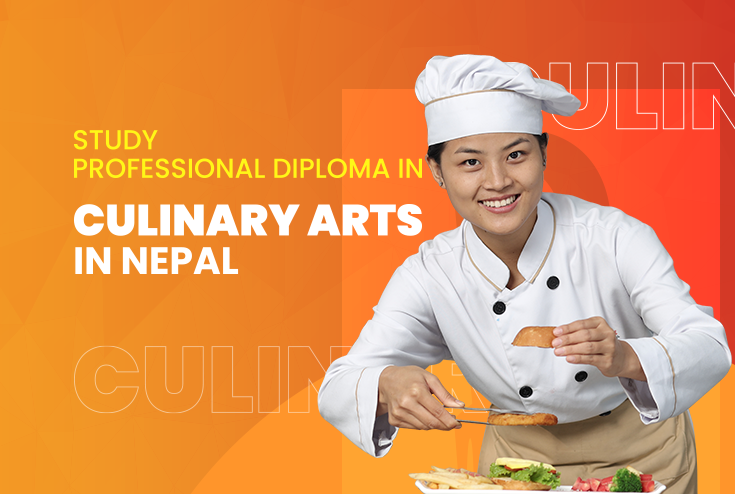Professional Diploma in Culinary Arts
Are you passionate about food and cooking? Do you dream of becoming a professional chef or working in the culinary arts industry? A professional diploma in culinary arts can be your gateway to a rewarding and exciting career in the world of food. In this article, we will explore the various aspects of pursuing a professional diploma in culinary arts, the benefits it offers, and the opportunities available in Nepal.
What is a Professional Diploma in Culinary Arts?
A professional diploma in culinary arts is a comprehensive program that provides aspiring chefs and culinary enthusiasts with the necessary skills and knowledge to excel in the culinary industry. It offers a structured curriculum that covers a wide range of culinary techniques, food preparation methods, kitchen management, and gastronomy.
Benefits of Pursuing a Professional Diploma in Culinary Arts
By enrolling in a professional diploma program in culinary arts, you can enjoy numerous benefits. Firstly, you will gain hands-on experience and practical training in various culinary techniques, allowing you to develop your skills and creativity in the kitchen. Additionally, you will learn about food safety and sanitation practices, menu planning, and culinary trends, which are essential for a successful culinary career.
Culinary Arts Industry in Nepal
The culinary arts industry in Nepal is thriving, with a growing number of restaurants, hotels, and catering services. The rich cultural heritage and diverse cuisine of Nepal create a unique culinary landscape, offering opportunities for culinary professionals to showcase their talent and explore local flavors. From traditional Nepali dishes to fusion cuisine, the culinary arts scene in Nepal is dynamic and ever-evolving.
Accredited Institutions and Programs
When considering a professional diploma in culinary arts, it is crucial to choose an accredited institution that offers high-quality programs. In Nepal, several renowned culinary schools and institutes provide comprehensive culinary arts education. These institutions often have experienced faculty members, state-of-the-art kitchen facilities, and industry partnerships that enhance the learning experience.
Curriculum and Course Structure
The curriculum of a professional diploma in culinary arts covers a wide range of subjects, including culinary theory, food preparation techniques, baking and pastry arts, nutrition, international cuisines, and kitchen management. The courses are designed to provide a balance between theoretical knowledge and practical skills, ensuring that graduates are well-prepared for the culinary industry.
Practical Training and Internships
One of the key components of a professional diploma in culinary arts is the emphasis on practical training and internships. Many programs provide opportunities for students to work in professional kitchens, hotels, or restaurants to gain real-world experience. These practical experiences allow students to apply their knowledge, develop their culinary techniques, and understand the dynamics of working in a fast-paced culinary environment.
Career Opportunities in Culinary Arts
Upon completing a professional diploma in culinary arts, graduates have a wide range of career opportunities available to them. They can work as chefs in restaurants, hotels, cruise ships, or resorts. They may also pursue careers as pastry chefs, catering managers, food stylists, culinary instructors, or personal chefs. The culinary arts industry offers diverse and exciting career paths for those with a passion for food and creativity.
Salary Potential and Job Growth
The salary potential in the culinary arts industry varies depending on factors such as experience, location, and the type of establishment. Entry-level positions may have a modest salary, but as chefs gain experience and establish their reputation, their earning potential increases. With the growing food industry in Nepal, there are ample opportunities for career advancement and job growth in the culinary arts field.
Success Stories of Professional Diploma Graduates
Numerous success stories exist within the culinary arts industry, where graduates of professional diploma programs have achieved great heights. From opening their own restaurants to becoming renowned celebrity chefs, these individuals have used their culinary education as a springboard for their careers. Their journeys inspire aspiring chefs to pursue their culinary dreams and showcase the immense possibilities within the field.
Challenges and Rewards in the Culinary Arts Field
The culinary arts field is not without its challenges. It requires dedication, hard work, long hours, and the ability to work under pressure. The fast-paced nature of the kitchen demands precision and attention to detail. However, the rewards are equally fulfilling. The joy of creating delectable dishes, the satisfaction of pleasing customers, and the opportunity to express one's culinary creativity make the challenges worthwhile for passionate individuals.
How to Choose the Right Culinary Arts Program
When selecting a culinary arts program, it is essential to consider several factors. Look for programs that offer a comprehensive curriculum, experienced faculty, industry connections, and opportunities for practical training. Consider the program's accreditation, reputation, and alumni success stories. It's also important to evaluate your own goals and aspirations to find a program that aligns with your interests and career objectives.
Application Process and Admission Requirements
Each culinary arts program may have its own specific application process and admission requirements. Typically, applicants are required to submit an application form, academic transcripts, letters of recommendation, and a personal statement expressing their passion for the culinary arts. Some programs may also conduct interviews or culinary skill assessments to assess an applicant's suitability for the program.
Scholarships and Financial Assistance
Financial considerations can be a significant factor when pursuing a professional diploma in culinary arts. Fortunately, many culinary schools and institutes offer scholarships or financial assistance programs to support deserving students. Research and inquire about the available scholarships and financial aid options to make your culinary education more accessible and affordable.
Conclusion
A professional diploma in culinary arts opens up a world of opportunities for individuals with a passion for food and a desire to create culinary masterpieces. Through comprehensive education, practical training, and exposure to the culinary industry, aspiring chefs can develop their skills, creativity, and knowledge. With Nepal's vibrant culinary arts industry, pursuing a professional diploma in culinary arts can pave the way for a fulfilling and successful career.
